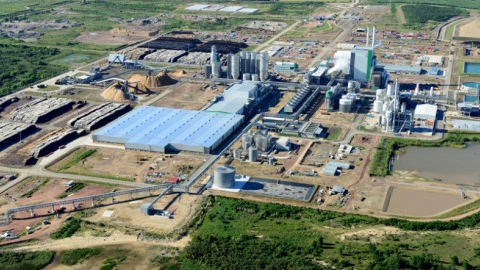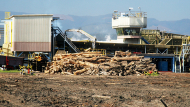Company – On record
This profile is no longer actively maintained, with the information now possibly out of date
Company – On record
This profile is no longer actively maintained, with the information now possibly out of dateWhy this profile?
Arauco has a 50+ year history of land grabbing and conversion of large tracts of land, with severe social and environmental impacts on wider areas. Financial institutions associated with Arauco and its longstanding land disputes, and the resulting social and environmental impacts, risk reputational risks. The social conflicts are of such an extent that they may result in stranded assets, due to conflict escalation. Financial institutions should utilise their leverage to demand Arauco address the ongoing impacts and, if this should fail, they should divest or suspend any financial agreements.
| Sectors | Biomass Electric Power Generation, Pulp, Paper and Paperboard Mills |
| Headquarters |
|
| Ownership |
Arauco is controlled by the Angelini family and is part of the Empresas Copec holding. |
| Subsidiaries |
|
| Website | https://www.arauco.com/ |
Celulosa Arauco y Constituición S.A. (Arauco) is Chile’s second largest pulp producer with a total capacity of 3.9 million tonnes of pulp. It has one million hectares of fibre plantations in South America and it owns seven pulp mills, nine saw mills, 30 panel mills and 13 energy plants. It has operations in Chile, Argentina, Uruguay, Brazil, the United States of America, Canada, Spain, Portugal, Germany and South Africa.
Impact on human rights and communities
Land conflicts Arauco has a long history of involvement in land conflicts in Chile, dating back to the 1970s. At the time, the military dictatorship distributed hundreds of thousands of hectares to plantation companies, without consulting or compensating the traditional owners of these lands, many of which were Indigenous Mapuche people. The regions that were converted to pine plantations are now among the poorest of the country, whereas the pulp company owners are among the richest people of South America.
After Chile returned to democracy, the Mapuche have started to revendicate the return of their lands, with little success. Many Mapuche live surrounded by eucalyptus plantations. They have lost their livelihoods and suffer from lack of water. This has led to strong tensions between the Mapuche and plantation companies including Arauco. There have been numerous cases of company trucks and cars being set on fire, which have been claimed by the Mapuche. On the other hand, the Mapuche suffer from criminalization and the militarization of their territories.
Militarization The reaction from the government to the Mapuche conflict has been the militarization of the region and the application of anti-terrorist law, which has been used to systematically criminalize the Mapuche people and to put several of them in jail. In September 2018, the government announced its plan for “peace and development of the Araucania”, which has been denounced by indigenous leaders as a plan for the big companies.
In November 2018, the Mapuche warrior Camilo Catrillanca was killed by the police, while he was driving his tractor, in the community of Temucuicui. This community is among the most active in the battle to recover land, and Catrillanca was a leading figure in this battle. A few days later, a protest in Santiago calling for justice for the Mapuche people, was violently repressed by the police with teargas and water canons.
Lack of FPIC for the MAPA project There are 35,000 indigenous people living in the village of Arauco, yet Arauco’s EIA for the MAPA project states that no indigenous communities will be affected by the expansion project. Mapuche communities that live nearby the Horcones complex took the government to court for providing Arauco with an Environmental License based on a flawed EIA.
Impact on tourism The aerial emissions of a pulp mill have a strong smell, which makes places downwind from pulp mills unattractive as a tourist destination. On top of that, the effluents of pulp mills pollute the nearby waters, making them unfit for swimming.
Arauco’s Validivia mill has had a strong negative impact on local tourism, as it is located close to a nature sanctuary. When it opened in 2004, the mill's effluents caused major pollution of the wetlands, leading to the death of thousands of birds and fish.
Air and noise pollution A group of around 30 elderly Mapuche from the community Carrizales de Bajo, in Ranquil, which lies at less than one kilometer from the Nueva Aldea mill, sued Arauco in October 2015 over pollution charges. They say that the mill regularly emits clouds of nauseating fumes which have put several people in hospital. The mill also makes a lot of noise and it has not covered a waste dump of lime, which is used at the mill and has a high dust content. The wind blows this dust into their houses causing health problems. The communities have been complaining since 2013 about bad smell and noise pollution.
Impact on fisheries sector The effluents discharged by Arauco’s mills impact on the fisheries sector. At the Horcones mill, there are strong concerns from local fishermen communities regarding the impact of the company’s expansion plans on the quantity and the quality of fish available. Questions during the consultation process of the EIA showed that Arauco has done very limited monitoring of the impacts.
In Valdivia there have been strong protests ever since Arauco announced its plans to build a 32 kilometer pipeline to discharge wastewater from its Valdivia pulp mill directly into the sea. Especially the Lafkenche communities fear the impacts on the fish and therefore their small-scale fisheries sector. With boats they have made blockades which made it impossible for Arauco to complete the EIA for the pipeline.
Labour issues In February 2016 workers from the Forest Transportation Federation - Fertraforma, started a strike. They felt they were being treated as cannon fodder by the plantation companies that make them work in conflict areas, on territories that are claimed by the Mapuche indigenous people.
Impact on nature and environment
Fires Large areas of monocultures of pinus or eucalyptus trees are very susceptible to fires. These are quite common in Chile, where almost every year there are large wildfires in and around plantations. In January 2017 the fires were exceptionally large. Arauco reported it has lost 72,564 hectares of plantations in the fires, equivalent to USD 210 million.
Lack of EIA for plantations for MAPA project The EIA for the MAPA project (the Arauco III line) only evaluated the impacts of the construction of the pulp line and the electricity line. Though it will increase the mills capacity by 1.56 million tonnes, the EIA did not look at impact of the plantations that will be required to feed the mill. This will probably include the conversion of pinus plantations to eucalyptus plantations, which are likely to further increase the problems of lack of water, as well as the risk of big fires.
Pollution of the Rio Cruces Sanctuary In 2004 Arauco opened a mill in Valdivia. The license for the mill was provided on the condition that Arauco would build a pipeline to discharge the wastewater into the sea. However, due to protests of fishermen this pipeline was not build and Arauco fell back to its initial plan, which was to discharge the wastewater in the Rio Cruces Sanctuary, an internationally protected Ramsar site, impacting also the national reserve Carlos Anwandter. Just months after the opening of the Valdivia plant, thousands of black-necked swans died. Rio Cruces was one of South America’s most important nesting sites for black-necked swans and an important source of income from tourism for the local population.
In January 2014, Arauco again discharged a green liquid into a nearby river, which led to a mass death of fish in the Cruces River.
Impacts on water availability A 2015 report on water availability in Arauco, written by the NGO Ingenieros Forestales por el Bosque Nativo and the Iniciativa ‘Agua que has de beber’, links plantations to water scarcity.
Other impacts
Dependency on subsidies The Chilean pulp industry, which includes Arauco but also its competitors, is heavily dependent on governmental support in the form of favourable legislation and subsidies. A large part of this support was provided by the 1974 Decree 701, which promoted the expansion of plantations through generous land distribution and large subsidies. The subsidies covered 75% of the production costs of plantations and it exempted the sector from taxes. This Decree was extended several times untill 2015.
Lobby against Environmental Legislation Arauco is trying to stop new legislation on water quality, as changes to the present regulations would make it impossible for it to operate its Valdivia mill.
Several private sector banks have financied Arauco via corporate loans and underwriting services. A detailed overview is listed below.
Applicable norms and standards
Incendios Forestales en Chile - ¿Lección aprendida?
2024
2024-02-06 00:00:00 | Chile's largest forestry companies Arauco and CMPC responsible for devastating forest fires
The International Rights of Nature Tribunal held its 11th Local Tribunal in the Biobío region in Chile on January 12 2024 focusing on the violations of the Rights of Nature arising from the forestry model and the devastating forest fires of 2023. The judges listened to the testimonies and evidence from experts, affected communities, and activists, reflecting the catastrophic impact of the forestry model on communities and the ecosystem. The judges concluded that forestry companies such as Arauco and CMPC were responsible for environmental destruction and compromising the fundamental rights of local communities. Read the full report from the proceedings.
2022
2022-06-23 00:00:00 | Stolen land and fading forests in Chile: A new report from the Environmental Paper Network
A new report by the Environmental Paper Network (EPN) together with Colectivo Viento Sur and Global Forest Coalition highlights the ongoing impacts of the pulp & paper industry in Southern-central Chile. Since 1974, when forestry companies, supported by the military dictatorship, too land from the Mapuche indigenous people to develop plantations. Since then, there has been an ongoing conflict between the Mapuche people and these forestry companies - Celulosa Arauco y Constitución and Compañía Manufacturera de Papeles y Cartones (CMPC). In the same time period, vast expanses of natural forests have been converted into plantations with timber plantations now occupying almost half (43%) of the Southern-central Chilean landscape. The report is Chapter 3 in a global investigative report series by EPN entitled "Conflict Plantations". Read the full report here.
2018
2018-07-24 00:00:00 | ARAUCO approves the construction of MAPA, the largest investment in the company's history
Today, ARAUCO’s Board of Directors approved the modernization and extension of Arauco Mill, an initiative that involves a US$2,350 million investment, the largest investment in the company’s history.
2014
2014-06-07 00:00:00 | Montes del Plata pulp mill starts operations
Stora Enso's and Arauco's joint operation Montes del Plata Pulp Mill at Punta Pereira in Uruguay has received all necessary permits from the Uruguayan authorities and is now starting up its operations. The pulp mill has an annual production capacity of 1.3 million tonnes of bleached chemical eucalyptus pulp (pulpapernews.com).
2014-02-06 00:00:00 | Chile's Arauco plans to increase pulp production by 40% with USD 2.1 billion investment
According to a Reuters report, Chile's Arauco y Constitucion seeks to expand its wood pulp production by over 40 percent with a recently approved USD 2,1 billion expansion project. With the new project, the company's overall wood pulp production will reach 2,1 million tonnes. On Wednesday, the Chilean authorities gave Arauco the environmental permit. ''The project, called the Proyecto Modernización y Ampliación Planta Arauco (MAPA), involves the suspension of Arauco mill's 280,000 tonne eucalyptus production line, a modernization of the 506,000 tonne pine line, and the construction of a third 1.56 million tonne line,''says Reuters.


